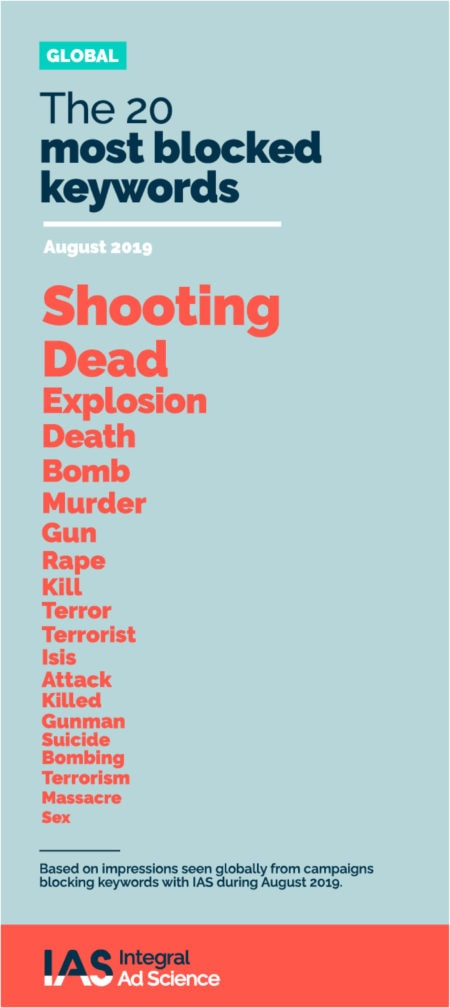Last week, Google announced it would move to block certain contextual information from its programmatic trading platforms. The move effectively amounts to a tech tax hike, but some hope it will lead to more household brands sponsoring news content.
The latest in the search giant’s ongoing privacy overhaul was prompted by regulators. Beginning in February 2020, advertisers won’t be able to see some of the content classification terms their ads may appear next to.
Despite the resulting increased risk for brand safety snafus on the Google ad exchange and higher costs, media buyers are treating the change as more of a thorn in the paw rather than a hole in the head.
Publishers, meanwhile, hold out hope for a potential welcome boost to their news coverage, which meets the threshold for brand safety but nonetheless is often blacklisted by marketers.
Contextual content will be removed from AdX
Google announced targeting limitations to its ad exchange last week, removing certain contextual information from ad opportunities on its trading platform AdX after it was directed to do so by regulators.
The updates mean media buyers participating in AdX auctions won’t be able to see certain types of content categories, such as news or weather, of the third-party websites they are bidding on beginning in February.
Chetna Bindra, senior product manager for user trust and privacy at Google, explained that the move was prompted by discussions with several regulators including the Data Protection Commission in the Republic of Ireland, which handles accountability under General Data Protection Regulations (GDPR).
“This change will help avoid the risk that any participant in our auctions is able to associate individual ad identifiers with Google’s contextual content categories,” she wrote in a blog post.

Even real news isn’t brand safe (all of the time)
Content categories have historically helped advertisers avoid bidding on ad space on websites that are not suitable for their brands. But removing the News category from AdX poses a potential pitfall for publishers.
It could also necessitate another much-loathed ad-tech tax that media buyers will have to shell out in order to spare embarrassment for their brands.
Legacy publishers are often quick to highlight that news is regularly the best performing content type on their web properties when it comes to clicks and eyeballs, but is not always rewarded in terms of media spend.
For instance, a 2018 study by Advertiser Perceptions found that 52% of brands felt pressured by their customer base to withhold ads from a media outlet based on its political affiliation.
Therefore, many advertisers rely heavily on keyword blacklists to distance themselves from potentially controversial content, with many erring on the side of caution, especially in such politically polarized times.
According to several sources, the combination of words on such blacklists results in many marketers leaving out ad inventory labeled with “news” when optimizing their programmatic media buys.
Not ideal, but not terminal
Sources claim the upcoming moves are nowhere near as impactful as Google pulling the DoubleClick ID from its ad stack immediately before GDPR enforcement began in May 2018, but nonetheless it will have an impact.
Rob Beeler, founder of ad-tech consultancy Beeler.Tech, noted how Google’s upcoming moves with AdX are likely a bid to assuage any lingering feelings of doubt when it comes to liability under GDPR, as well as the California Consumer Privacy Act.
“Where I could see it as an issue is if I’m www.news.com, not passing context helps me on my political pages, which brands shy away from, but what about my business or travel sections?” Beeler said. “If that info isn’t being passed on, you are just buying www.news.com. My guess is that could potentially hurt publishers’ [CPMs].”
Potential workarounds
Several sources noted how the upcoming AdX changes will likely result in agencies working with third-party verification providers such as Integral Ad Science or DoubleVerify to try and ascertain additional contextual signals.
https://www.adweek.com/programmatic/how-googles-upcoming-adx-changes-could-affect-media-buys/

